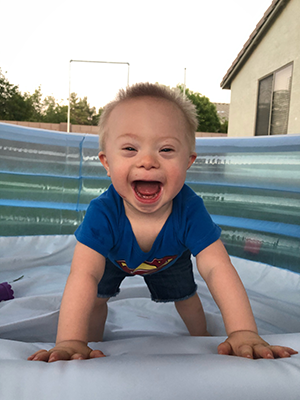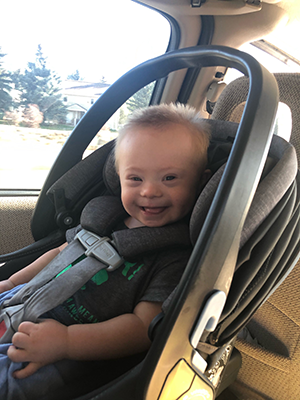At Wits’ End
DDD Offers a Lifeline to a Chandler Mom

Katrina Mattingly didn’t know what to do, whom to ask or even what questions to ask when she brought her newborn son home from the hospital. Nathaniel, known to the family as “Nate the Great,” was born with Down syndrome and a congenital heart disorder. But guidance came when her pediatrician referred her to the DES Arizona Early Intervention Program (AzEIP) and eventually, to the Division of Developmental Disabilities (DDD). Early intervention builds upon and provides supports and resources to assist family members and caregivers to enhance children’s learning and development through everyday learning opportunities; while DDD empowers eligible Arizonans with developmental disabilities to lead self-directed, healthy and meaningful lives.
Katrina recalls the tough times she faced prior to AzEIP and DDD services. “I thought I was going to go crazy. I think I was crying every single day. How am I going to do this?” Soon after, Nate was approved for Arizona Long-Term Care Services (ALTCS), and DDD’s Jennifer DeGenova was assigned as Nate’s Support Coordinator.
“I’m so happy,” said Katrina. “I was so excited! I’m finally going to get help, I’m going to figure out all this stuff. I couldn’t stop crying. I didn’t know what to do and this is going to be so much easier!
“Jennifer is incredible--she is a super star. I text her questions if I need help with something, and by the end of the day, I always get a text back from her. She just goes above and beyond.”
Previously, Nate wasn’t using protective responses to break his falls. “He would just come down and hit his head. For the longest time, we couldn’t get him to use protective responses. He would just smash his face or head or fall backwards. He had to work through so much.”
A representative of Dynamite Therapy, a DDD services provider, called Katrina and offered to conduct an assessment for therapy services. Based on the initial assessment, Nate was approved for an occupational therapist to make home visits. That’s when Cheryl Miller appeared on the scene.
Today, Nate has learned how to sit down on his own and at 16-months of age, he now toddles across furniture. “He’s come leaps and bounds,” said Katrina. “He likes to stand up on furniture. But he’s got his protective responses now. So he stands there, looks at me and puts his hands up and then he’ll fall and catch himself. His motor skills are going 100-miles-an-hour. It seems, once we came out of that slump, he started to do more stuff.”

Nate is also drinking from a straw. “That’s a huge help. If you don’t have a bottle, bottles get dirty, [Cheryl] has him drinking from a straw now. [Cheryl] gave me so many different ideas: Help with his chewing. Help with his feeding. There were so many things she had me doing with him that it was building blocks.”
“Nate is a pretty happy kid,” said Katrina. “He’s not as laid back as other kids with Down syndrome. When I can’t figure out what he wants, he pinches us. He’s so frustrated. Even if he can make a noise and try to tell me. We do sign language; we do all of these different things. Right now we’re working on a photo book so he can point to show us [what he wants]. He’s so behind in a lot of that stuff, I don’t think he totally gets what I’m trying to communicate with him.”
While extremely pleased with Cheryl and Jennifer, Katrina felt she needed more help. Jennifer recommended respite services so Katrina could have the time to take care of herself.
“It’s just a relief to have that extra help. I know it’s supposed to be for the parents to relax, but for me, I just needed balancing. I needed help to juggle everything.” Katrina also has a three-year-old son who has a heart condition and a son who has ADHD. Thankfully, Katrina’s 8-year-old daughter does not have the heart condition. “[Respite services] just came at the right time where I said, OK, I can do this.”
Relying on AzEIP and DDD services, Katrina and Nate the Great are progressing well. “I’m so grateful that I have Cheryl and Jennifer.” And AzEIP and DDD are pleased to be able to help the Mattinglys with their journey to achieving a self-directed, healthy and meaningful life.
By Lyn Riley

